Medicinal herbs from your own garden are often the first step in combating cold symptoms. We give tips on which herbs are particularly suitable for coughs and colds.
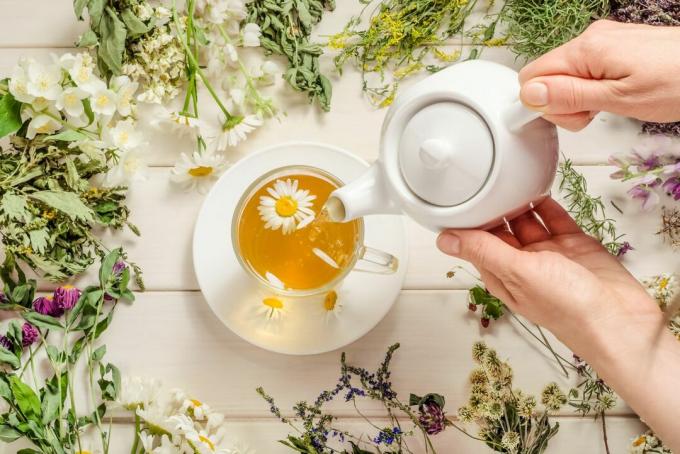
As soon as it gets colder outside, the cold season begins - plants that grow in our own garden can also provide help with mild symptoms. We present some beneficial herbs against cold.
contents
- Thyme for a cold
- chamomile
- elder
- buckhorn
- sage
- Linden Blossoms
- licorice
- fennel
- peppermint
- Ginger
Thyme for a cold
In addition to the Mediterranean flavor of the real thyme (Thymus vulgaris) Thyme also helps against coughs. The thymol contained in the essential thyme oil has a disinfecting and expectorant effect. Thyme tea can be drunk or gargled. A mouthwash can be made by mixing water and a few drops of thyme oil. To inhale, mix 1 liter of hot water with two drops of thyme oil. A cold bath with thyme also has a beneficial effect. The oil should always be used sparingly, as it irritates the mucous membranes in too high a concentration.

chamomile
Chamomile is used in many different ways in the medicine chest. In addition, the application is very simple. The flowers of chamomile in particular contain a large proportion of 0.3 to 1.5% of essential oils. These have an antibacterial, anti-inflammatory and calming effect. The chamomile relieves coughing and loosens stubborn mucus. It is suitable for use as a medicinal plant Real chamomile (Matricaria chamomilla) excellent, but also the Roman chamomile (Chamaemelum nobile) can be used. The most common and easiest use of chamomile for colds is in the form of chamomile tea, which is good for sore throats, or as a mouthwash. The calming effect relieves inflammation in the mouth and throat. Inhaling chamomile is even more effective than chamomile tea, as the ingredients go directly to the lungs and the mucous membranes are moistened. More effects and more about the Use of chamomile as a medicinal plant can be found in our special article.
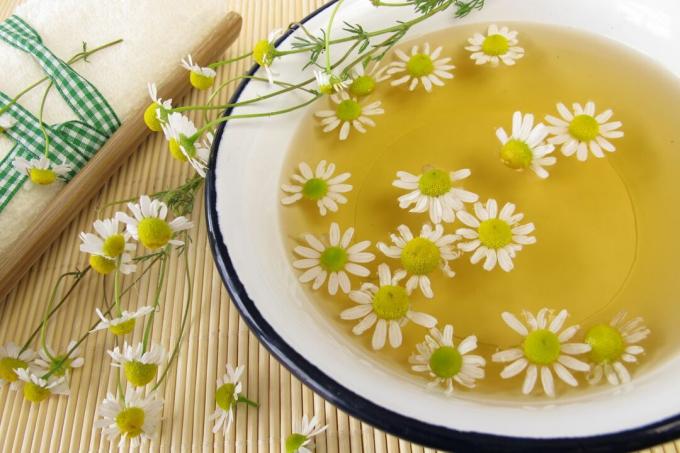
elder
The flowers and fruits of elderberries (Sambucus) help to expel infections that have settled in the sinuses or bronchi. They contain essential oils, flavonoids and vitamin C, which is important for the immune system. Thus, cold symptoms can be fought with tea or an infusion. In addition, elderflower juice strengthens the immune system and the juice of the fruit helps against headaches and body aches.

buckhorn
buckhorn (Plantago lanceolata) is a popular medicinal plant for colds, if only because it can be found almost everywhere. The mucilage it contains soothes irritated and dry mucous membranes. Plantain also has an antibacterial and anti-inflammatory effect. The application takes place as a tea from the dried leaves, which is either drunk or gargled.
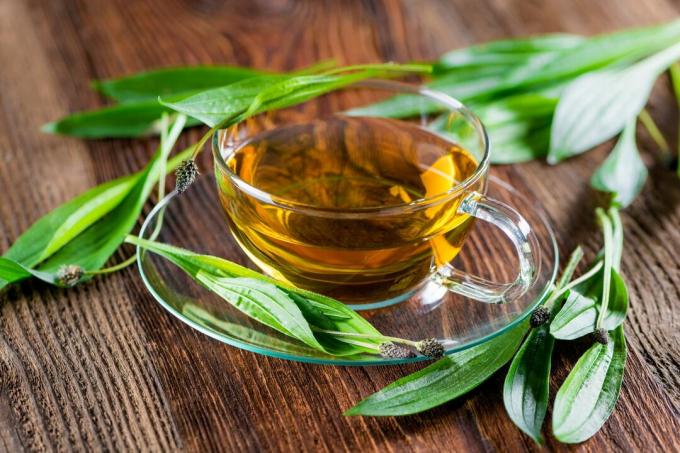
sage
the in sage (Salvia officinalis) contained mucilage and tannins, essential oils and flavonoids have an antibacterial and antiviral effect. They also protect the mucous membranes from drying out. For coughs and sore throats, sage candies can relieve the urge to cough and the pain. If you have a stuck cough, you can drink sage tea or gargle. If the sinuses are inflamed, it is also helpful to inhale the sage.
For growing at home, for example, is ours Plantura Organic Herb & Seed Soil to recommend. The loose and airy structure, together with a balanced supply of nutrients, ensures aromatic herbs.

Plantura Organic Herb & Seed Soil
Organic, peat-free & climate-friendly:
For aromatic herbs and for
successful sowing, cuttings
propagation & for pricking out
Linden Blossoms
Linden Blossoms are mainly consumed as tea. The recommended daily dose of 2 to 4 g should not be exceeded. The mucilage contained in the flowers relieves the urge to cough and protects the mucous membranes. The sweat-inducing effect of lime blossom tea helps to sweat out the infection. In addition, linden blossoms are often used for inhalation. The summer linden (Tilia platyphyllos) and the small-leaved lime (Tilia cordata). The best time to collect linden blossoms is in June and July, a few days after the trees start flowering.

licorice
licorice (Glycyrrhiza glabra) is not only used to make liquorice, but is also said to help against colds. The liquorice root contains, among other things, saponins, phytosterols and flavonoids. These have an antibacterial and antiviral effect. In addition, the bronchial mucosa is stimulated to produce more thin secretion. This makes thick mucus easier to cough up. It is usually used as a tea. If you have bile stasis, high blood pressure, kidney failure or are pregnant, you should avoid licorice.
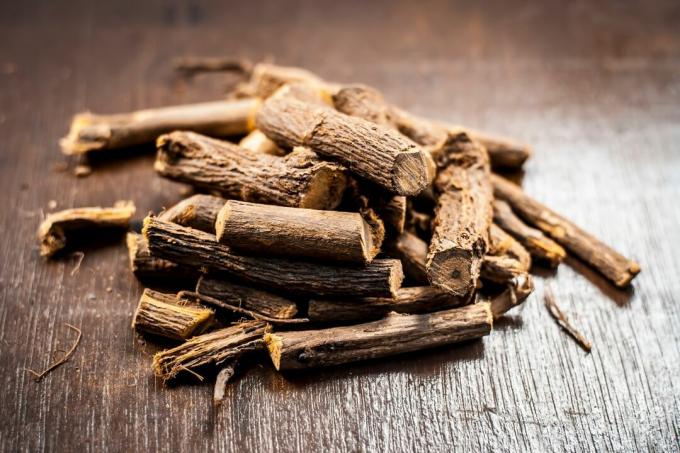
fennel
fennel (Foeniculum vulgare) is not only a medicinal herb, but also a popular and very old spice. Bitter fennel is particularly effective against colds. This contains essential oils that ensure that stubborn mucus is loosened from the bronchi and removed. Fennel tea is most commonly taken or inhaled for a sore throat. Its calming effect is beneficial for coughs and colds. For fresh fennel tea, crush the fennel seeds or leaves in a mortar and then pour hot water over them. Fennel oil is also used as a tincture or for inhalation. However, pregnant women, infants and small children should avoid fennel if they have a cold.

peppermint
peppermint (Mentha × piperita) contains essential oils, tannins, flavonoids and other secondary plant substances - the menthol it contains also has an antibacterial effect. The best known is the use as peppermint tea, but inhaling peppermint is also possible. Danger! Pure menthol should not be used on young children or infants as it can cause respiratory arrest.
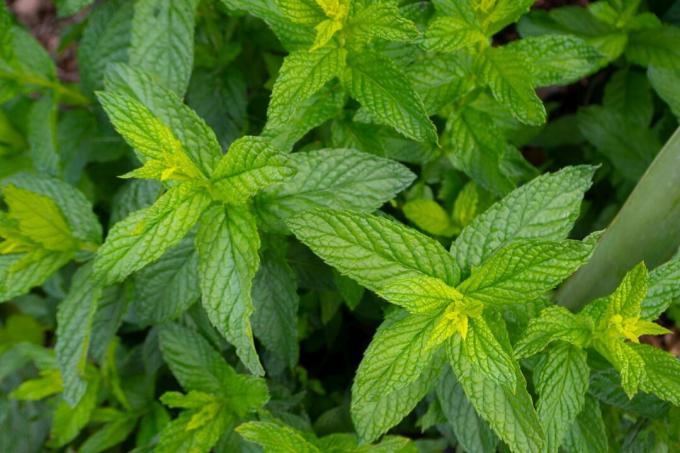
Ginger
Ginger (Zingiber officinale) is a popular kitchen ingredient and medicinal plant. Its anti-inflammatory effects, along with boosting the immune system, help treat cold symptoms. It also helps with nausea and vomiting. Ginger is often used as a shot or as an ingredient in food. Ginger tea is also known for its beneficial effects. When preparing ginger tea, you should pour hot water over the ginger immediately after cutting it open. The ginger does not have to be peeled for this. The tea should then steep for at least 5 minutes.

Tip: A spoonful of honey in a homemade cold tea not only tastes good, but also has an additional antibacterial and anti-inflammatory effect.
Whichever herb you choose, make sure you get enough rest and sleep and wrap up warm. If the symptoms do not improve or are very severe, you should definitely consult a doctor, because treatment with home remedies cannot replace a visit to the doctor.
Cold time is tea drinking time. More about the best Herbal tea blends from the garden and exciting recipes can be found in our special article.
...and receive concentrated plant knowledge and inspiration directly in your e-mail inbox every Sunday!
